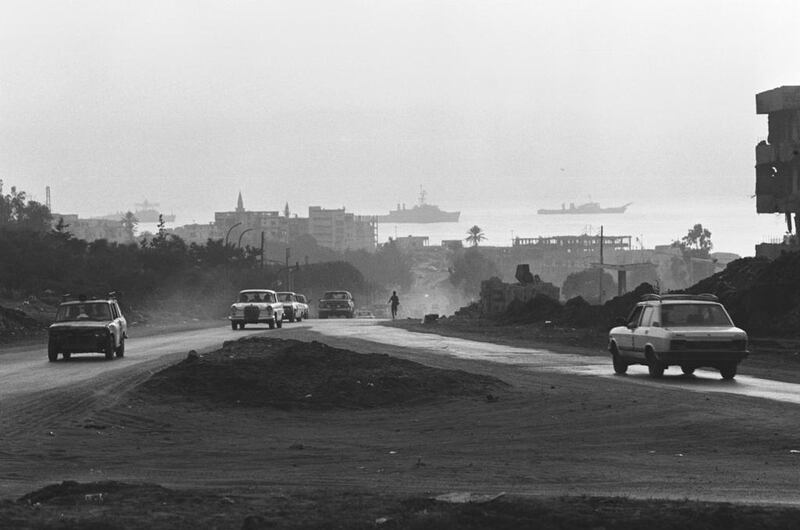Beirut, Beirut
Sonallah Ibrahim
Bloomsbury
Dh79
That Smell, the 1966 debut novel from the acclaimed Egyptian writer Sonallah Ibrahim, is a short but predictably pungent tale about a political prisoner who, on securing his freedom, struggles to adapt to civilian life. Ibrahim's narrator traverses Cairo in a stupor but offers scant commentary and vouchsafes no opinions. And yet, despite his reticence and his befuddlement, the Egyptian capital comes vibrantly alive.
A later novel from Ibrahim, Beirut, Beirut (1988), now published for the first time in English by Bloomsbury, gives the reader another in-depth and upfront portrait of a city, this time with plenty of commentary. His nameless narrator flies from Cairo to Beirut to look for a publisher for the controversial book he has written. A newspaper article leads him to believe that a decisive ceasefire may be imminent in the ongoing Lebanese Civil War, but, upon landing, he is quickly disabused of this. One publishing house interested in his book is bombed. Everyone he encounters carries a gun and employs bodyguards. Everything from parked cars to lifts are possibly rigged with explosives.
But our narrator fearlessly explores the city. He reacquaints himself with Wadia, an old school friend who, like him (and the hero of That Smell, and Ibrahim himself), was once imprisoned for his political views. He hobnobs with writers, scholars and directors and runs afoul of the secret police. Two alluring women captivate him: Lamia, the wife of a publisher, and Antoinette, a filmmaker who enlists him to write a voiceover commentary for a film about the war.
The novel splits into an account of one man negotiating a foreign, conflict-riven land and a detailed overview of that conflict. While the latter is undeniably informative, it stymies the momentum of the former. The narrator’s active exploits alternate with his passive viewing of Antoinette’s Moviola reels containing declaratory title cards, scenes of brutality, snapshots of history and excerpts from newspapers and interviews. As the abundance of fact threatens to preponderate, we are left wondering if what we are reading can truly be classified as a novel.
Those familiar with Ibrahim's work will not be surprised by this structure. Beirut, Beirut's excellent translator, Chip Rossetti, explains in his afterword that the author "successfully blurs the genres of journalism and fiction". Ibrahim's novels are full of documents and articles which serve to contextualise and edify – in a sense, they factualise his fiction. But this time round, instead of subtly interspersing his facts, he amasses them in thick, narrative-clogging units. Six chapters are given over to the war – its origins, atrocities, casualties, and numerous breakthroughs and stalemates – and halfway through each expositional segment, the reader yearns to get back to the narrator's pursuits.
For it is the narrator who carries the novel. He learns he is ideal for providing the film’s commentary because it is necessary to have an outsider’s perspective “so that his point of view is objective and fresh”. Mercifully it is so, lecturing but never hectoring, “reportorial and terse, without a trace of stirring emotions or sorrow in the tone”. We get the same cool style of commentary outside on the streets of Beirut, much of the time sound-tracked by the staccato sounds of gunfire or the drone of Israeli planes. He observes and records, unruffled by the stories of carnage he picks up: “Sitting down to eat after witnessing a group of rotting corpses” or “Fires blazing and rockets launching while the radio is playing pop music”. His evasive, whisky-fuelled conversations render him an enigma, but we are given a glimpse of his true colours towards the end, first when he is kidnapped and secondly in a final, violent throe of passion.
Ibrahim’s sharp journalistic eye conjures up vivid images: the walls of elegant shops and boutiques daubed with slogans and bedecked with political posters, flags and pictures of martyrs; Antoinette leaving East Beirut for work in the morning dressed in a blouse and skirt and swapping them in West Beirut for military overalls and a Kalashnikov. The seedy locales frequented by revolutionaries, thieves and exiles, and the agents of the state intelligence bureau who are “working for all the political movements, not to mention international spy agencies” recall Graham Greene’s murky glamour and moral ambiguity.
On its cover, Beirut, Beirut is described as "a novel of love and war", a proclamation that is only half-true. Lust figures more than love. War, on the other hand, is unadulterated and omnipresent.
Smaller portions would have been more effective, but we still come away from this engrossing book with a better understanding of Beirut’s past torment and a lingering impression of the outsider who dares to look in.
Malcolm Forbes is a regular contributor to The Review.





